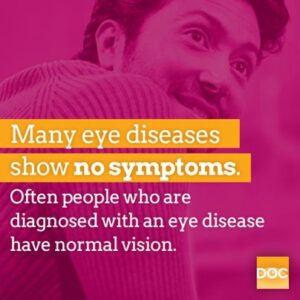My next eye exam appointment is coming up, and I haven’t had one in a while. Is there anything I need to do or bring?
A lot of times an eye exam appointment is something patients arrive to in a rushed state of mind, and really just want to get in and out. They want to hear from their family eye doctor that everything is perfect with their eyes. However, it is best to do a little prep prior to your appointment. This article will help you better understand the why and provide you with a list of things you need to remember, so read on!
A lot of times an eye exam appointment is something patients come to rushed, and really just want to get in and out of. They want to hear from their family eye doctor that everything is perfect with their eyes. However, it is best to do a little prep prior to your appointment. This article will help you better understand the why and provide you with a list of things you need to remember, so read on!
Why Do I Need To Prepare For My Eye Exam?
A little preparation prior to your comprehensive eye exam will go a long way. You will get more out of the appointment because you will be actively engaged. As I mentioned before, many patients really just want to hear that their eyes are A-OK and would like an updated prescription. But, an eye exam is so much more. A routine eye exam can uncover symptoms of a sight-threatening eye disease, which may lead to blindness. Also, your eyes are the windows to your body’s health, so, they can signal many non-related eye issues like high blood pressure, diabetes, or a brain tumor.
Ensuring you know your family medical history, for example, is one way you can help your optometrist choose the best course of action for your eyes. How? Many eye conditions are hereditary. So this means if, say your mother has Macular Degeneration (AMD), and her mother had it too. Your chances are increased for developing AMD. Informing your optometrist of this allows him or her to take a proactive approach to your eye care, which ensures you are educated. So, should you begin to develop this eye condition, since you will know how to recognize the symptoms, you can come in sooner than later for an assessment and better treatment options. This approach is far better than say, if you just ignored the initial symptoms.
What Should I Bring to My Eye Appointment?
The next time you have an appointment with your eye doctor, ensure to bring the following items with you:
- BC Care Care
- Extended Health Card (if applicable)
- Family medical history
- Contact lenses or prescription glasses
- Sunglasses in case your eyes are dilated
- List of prescription medication taken by you
- List of questions or concerns regarding your eyes
If your optometrist determines that you need to see an eye specialist, our front staff will be able to do so. So, don’t forget to check-out with them. Additionally, if you require new glasses, we can recommend several reputable opticians from which new prescription glasses or sunglasses can be purchased. Contact lenses can be purchased from our office directly, and also billed to your third party insurance provider at the time of purchase.
Did You Understand Your Eye Exam Results?
At Inner Harbour Optometry it is important to us that our patients feel comfortable and ask questions! We want to ensure you understand your eye exam results, and that any and all questions are answered. The more you know, the more aware you are of potential symptoms to look for. And this could ultimately save your sight.
Dr. Sharma enjoys taking an active approach in getting to know his patients, both in person and online. If you like connecting through social media, check out our various social media profiles and blog, and tell us what you think. We love hearing from our valued patients!
Alright, Now That I Have Gotten My Exam, Now What?
 Your family eye doctor has assessed your vision and your eye health, and you have received an updated prescription. He has indicated that nothing looks abnormal, but it’s important to know that things can change. This is why you must keep up with your regular eye exams since many eye conditions and diseases have little-to-no symptoms, and simply go unnoticed by patients. Not having a routine eye exam, or not coming in because you think the issue will just go away, could really make the situation worse and irreversible. When it comes to the eyes, being proactive is key. This means taking appropriate care of your eyes and making your eye exam. Those patients who have pre-existing issues may need to come in more routinely.
Your family eye doctor has assessed your vision and your eye health, and you have received an updated prescription. He has indicated that nothing looks abnormal, but it’s important to know that things can change. This is why you must keep up with your regular eye exams since many eye conditions and diseases have little-to-no symptoms, and simply go unnoticed by patients. Not having a routine eye exam, or not coming in because you think the issue will just go away, could really make the situation worse and irreversible. When it comes to the eyes, being proactive is key. This means taking appropriate care of your eyes and making your eye exam. Those patients who have pre-existing issues may need to come in more routinely.
When is the last time you had your eyes assessed by an optometrist? Give us a call or book online with Dr. Sharma, and rest easy that you’re in good hands!
We are Victoria’s trusted family eye care center.

